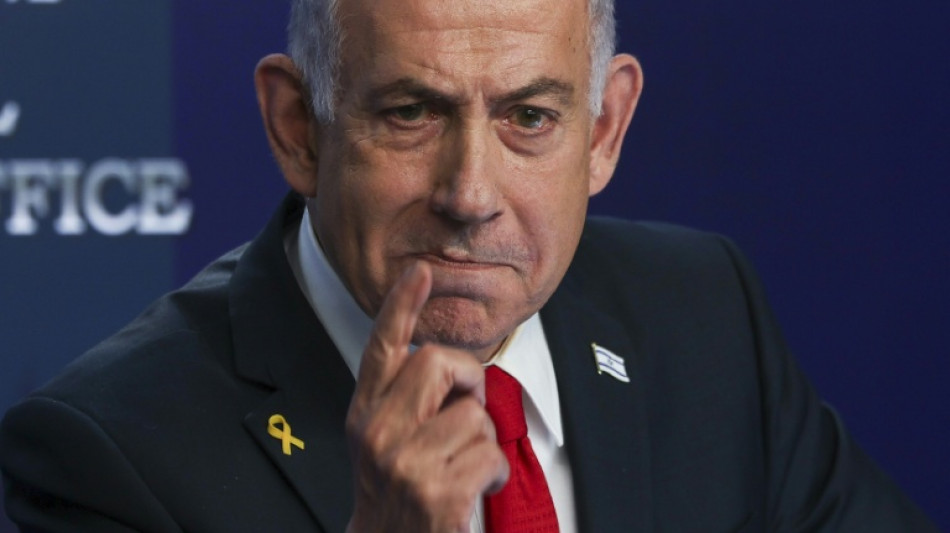
-
 Hundred-plus detained after fans 'lynched' during South America cup tie
Hundred-plus detained after fans 'lynched' during South America cup tie
-
Trump hails 'total victory' as US court quashes $464 mn civil penalty

-
 Stocks waver ahead of Fed speech but EU tariff deal lifts Europe
Stocks waver ahead of Fed speech but EU tariff deal lifts Europe
-
Slot says Liverpool will only sign right player at right price amid Isak row
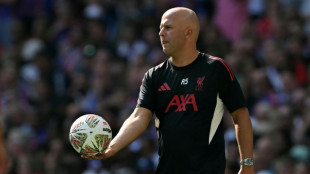
-
 Walmart expects better sales, earnings as shoppers squeezed by tariffs
Walmart expects better sales, earnings as shoppers squeezed by tariffs
-
Malnourished Gaza children facing death without aid, says UN
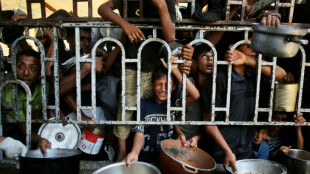
-
 Autopsy rules out 'trauma' in Frenchman livestream death
Autopsy rules out 'trauma' in Frenchman livestream death
-
Liverpool's Frimpong out for several weeks with hamstring injury

-
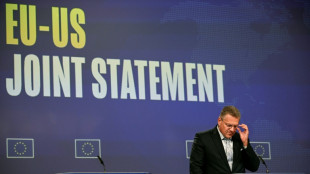 EU gets 15% US tariff for cars, but fails to get wine reprieve
EU gets 15% US tariff for cars, but fails to get wine reprieve
-
Leverkusen rebuild continues with Bade and Echeverri signings

-
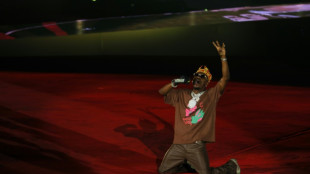 Ghana singer Shatta Wale held in US fraud probe over Lamborghini purchase
Ghana singer Shatta Wale held in US fraud probe over Lamborghini purchase
-
Wales skipper Callender passed fit for Women's Rugby World Cup opener against Scotland

-
 Only goal is to win, says ever-competitive veteran Fraser-Pryce
Only goal is to win, says ever-competitive veteran Fraser-Pryce
-
Maresca adamant Fofana 'very happy' at Chelsea

-
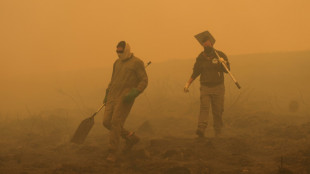 Record EU wildfires burnt more than 1 mn hectares in 2025: AFP analysis
Record EU wildfires burnt more than 1 mn hectares in 2025: AFP analysis
-
Hurricane Erin brings coastal flooding to N. Carolina, Virginia

-
 Stocks slide as investors await key Fed speech
Stocks slide as investors await key Fed speech
-
EU gets 15% US tariff for cars, fails to secure wine reprieve
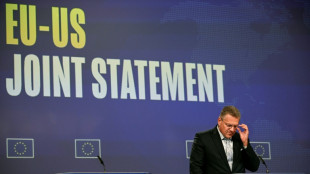
-
 Russian fuel prices surge after Ukraine hits refineries
Russian fuel prices surge after Ukraine hits refineries
-
Maguire feels it will be 'silly' to leave Man Utd now

-
 Ukrainian suspect arrested in Italy over Nord Stream blasts
Ukrainian suspect arrested in Italy over Nord Stream blasts
-
England include ex-skipper Knight in Women's World Cup squad as Cross misses out

-
 Walmart lifts outlook for sales, earnings despite tariffs
Walmart lifts outlook for sales, earnings despite tariffs
-
UK sees record asylum claims as row brews over housing

-
 Swiss international Okafor move to Leeds heralds new EPL record
Swiss international Okafor move to Leeds heralds new EPL record
-
Microsoft re-joins handheld gaming fight against Nintendo's Switch

-
 McReight to captain Wallabies against Springboks
McReight to captain Wallabies against Springboks
-
Taiwanese boxer Lin agrees to gender test for world championships

-
 Stocks slip as investors await key Fed speech
Stocks slip as investors await key Fed speech
-
Hong Kong mogul Jimmy Lai's 'punditry' not criminal: lawyer

-
 Bournemouth sign 'proven winner' Adli from Leverkusen
Bournemouth sign 'proven winner' Adli from Leverkusen
-
Israel pounds Gaza City as military takes first steps in offensive
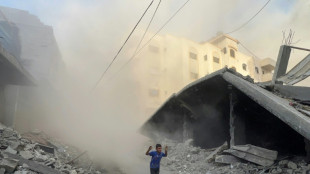
-
 First security guarantees, then Putin summit, Zelensky says
First security guarantees, then Putin summit, Zelensky says
-
Suspended Thai PM testifies in court case seeking her ouster

-
 Shilton congratulates Brazilian goalkeeper Fabio on breaking record
Shilton congratulates Brazilian goalkeeper Fabio on breaking record
-
Markets mixed as investors await key Fed speech

-
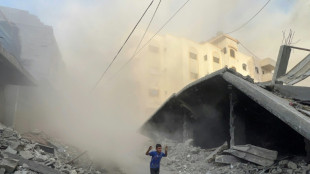 Israel pounds Gaza City after offensive gets green light
Israel pounds Gaza City after offensive gets green light
-
Fraser-Pryce seeks Brussels boost ahead of Tokyo worlds

-
 Asian markets mixed as investors await key speech
Asian markets mixed as investors await key speech
-
Ten hurt, 90 arrested as match abandoned following fan violence in Argentina
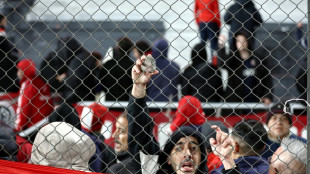
-
 Indian heritage restorers piece together capital's past
Indian heritage restorers piece together capital's past
-
Australian Rules player suspended for homophobic slur

-
 Online behaviour under scrutiny as Russia hunts 'extremists'
Online behaviour under scrutiny as Russia hunts 'extremists'
-
Malaysia rules out return of F1 over costs
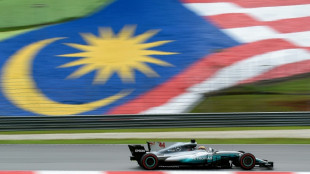
-
 German firm gives 'second life' to used EV batteries
German firm gives 'second life' to used EV batteries
-
Wallabies great Will Genia announces retirement at 37

-
 South Africa spinner Subrayen cited for suspect bowling action
South Africa spinner Subrayen cited for suspect bowling action
-
Menendez brothers face parole board seeking freedom after parents murders

-
 Weaponising the feed: Inside Kenya's online war against activists
Weaponising the feed: Inside Kenya's online war against activists
-
Africa could become 'renewable superpower', says Guterres
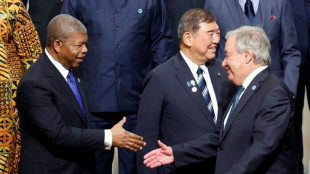
| RBGPF | 0% | 73.27 | $ | |
| CMSC | 0.21% | 23.49 | $ | |
| RELX | -1.05% | 48.185 | $ | |
| SCS | -0.37% | 16.12 | $ | |
| BP | -0.09% | 33.85 | $ | |
| NGG | -0.97% | 71.39 | $ | |
| BTI | 0.26% | 59.165 | $ | |
| GSK | 0.52% | 40.28 | $ | |
| RIO | 0.64% | 61.01 | $ | |
| RYCEF | 1.36% | 13.94 | $ | |
| CMSD | -0.06% | 23.675 | $ | |
| AZN | 0.18% | 80.665 | $ | |
| BCC | -0.51% | 84.07 | $ | |
| BCE | -0.78% | 25.54 | $ | |
| JRI | -0.04% | 13.325 | $ | |
| VOD | -0.76% | 11.81 | $ |

Iran-Israel war: a lifeline for Netanyahu?
The Iran-Israel war has helped strengthen Israeli Prime Minister Benjamin Netanyahu domestically and overseas, just as his grip on power looked vulnerable.
On the eve of launching strikes on Iran, his government looked to be on the verge of collapse, with a drive to conscript ultra-Orthodox Jews threatening to scupper his fragile coalition.
Nearly two years on from Hamas's unprecedented attack in 2023, Netanyahu was under growing domestic criticism for his handling of the war in Gaza, where dozens of hostages remain unaccounted for.
Internationally too, he was coming under pressure including from longstanding allies, who since the war with Iran began have gone back to expressing support.
Just days ago, polls were predicting Netanyahu would lose his majority if new elections were held, but now, his fortunes appear to have reversed, and Israelis are seeing in "Bibi" the man of the moment.
– 'Reshape the Middle East' –
For decades, Netanyahu has warned of the risk of a nuclear attack on Israel by Iran -- a fear shared by most Israelis.
Yonatan Freeman, a geopolitics expert at the Hebrew University of Jerusalem, said Netanyahu's argument that the pre-emptive strike on Iran was necessary draws "a lot of public support" and that the prime minister has been "greatly strengthened".
Even the opposition has rallied behind him.
"Prime Minister Benjamin Netanyahu is my political rival, but his decision to strike Iran at this moment in time is the right one," opposition leader Yair Lapid wrote in a Jerusalem Post op-ed.
A poll published Saturday by a conservative Israeli channel showed that 54 percent of respondents expressed confidence in the prime minister.
The public had had time to prepare for the possibility of an offensive against Iran, with Netanyahu repeatedly warning that Israel was fighting for its survival and had an opportunity to "reshape the Middle East."
During tit-for-tat military exchanges last year, Israel launched air raids on targets in Iran in October that are thought to have severely damaged Iranian air defences.
Israel's then-defence minister Yoav Gallant said the strikes had shifted "the balance of power" and had "weakened" Iran.
"In fact, for the past 20 months, Israelis have been thinking about this (a war with Iran)," said Denis Charbit, a political scientist at Israel's Open University.
Since Hamas's October 7, 2023 attack on Israel, Netanyahu has ordered military action in Gaza, against the Iran-backed Hezbollah group in Lebanon and the Huthis in Yemen, as well as targets in Syria where long-time leader Bashar al-Assad fell in December last year.
"Netanyahu always wants to dominate the agenda, to be the one who reshuffles the deck himself -- not the one who reacts -- and here he is clearly asserting his Churchillian side, which is, incidentally, his model," Charbit said.
"But depending on the outcome and the duration (of the war), everything could change, and Israelis might turn against Bibi and demand answers."
– Silencing critics –
For now, however, people in Israel see the conflict with Iran as a "necessary war," according to Nitzan Perelman, a researcher specialised in Israel at the National Centre for Scientific Research (CNRS) in France.
"Public opinion supports this war, just as it has supported previous ones," she added.
"It's very useful for Netanyahu because it silences criticism, both inside the country and abroad."
In the weeks ahead of the Iran strikes, international criticism of Netanyahu and Israel's military had reached unprecedented levels.
After more than 55,000 deaths in Gaza, according to the health ministry in the Hamas-run territory, and a blockade that has produced famine-like conditions there, Israel has faced growing isolation and the risk of sanctions, while Netanyahu himself is the subject of an international arrest warrant for alleged war crimes.
But on Sunday, two days into the war with Iran, the Israeli leader received a phone call from European Commission President Ursula von der Leyen, while Foreign Minister Gideon Saar has held talks with numerous counterparts.
"There's more consensus in Europe in how they see Iran, which is more equal to how Israel sees Iran," explained Freeman from the Hebrew University of Jerusalem.
German Chancellor Friedrich Merz said Tuesday that Israel was doing "the dirty work... for all of us."
The idea that a weakened Iran could lead to regional peace and the emergence of a new Middle East is appealing to the United States and some European countries, according to Freeman.
But for Perelman, "Netanyahu is exploiting the Iranian threat, as he always has."
Y.AlMasri--SF-PST

